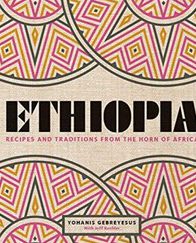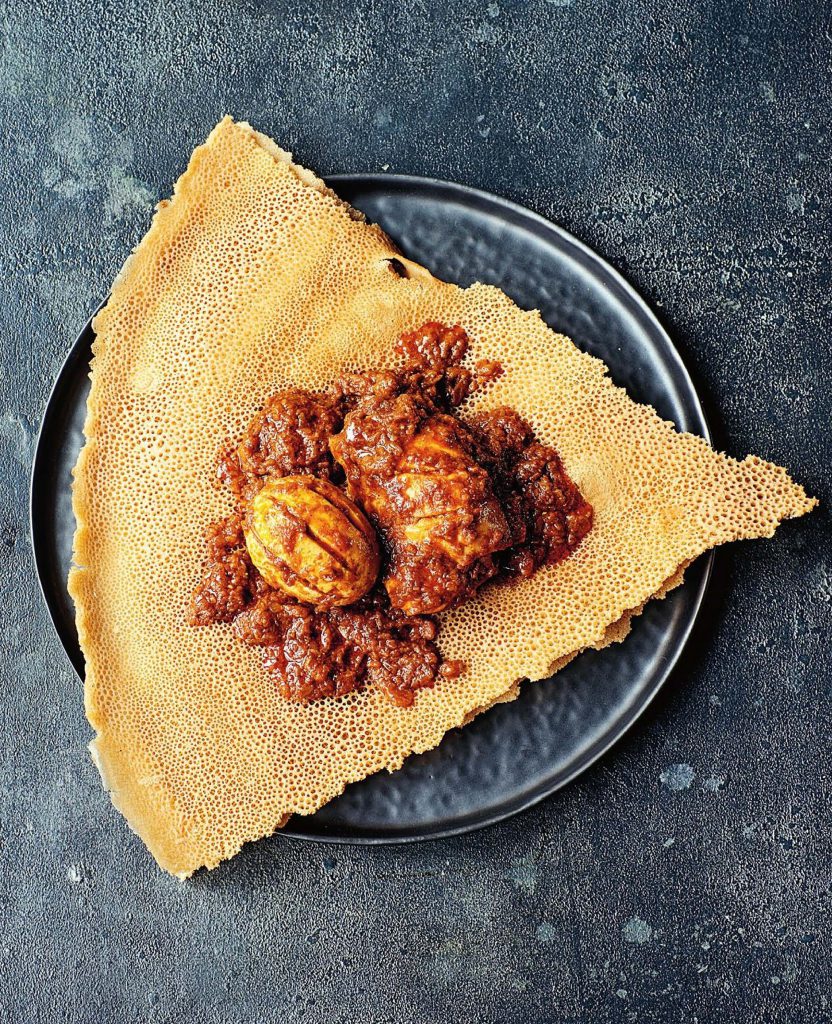Ethiopia Cookbook Giveaway
September 5, 2019 by JennyEnter to win a copy of Ethiopia: Recipes and Traditions from the Horn of Africa by Yohanis Gebreyesus and Jeff Koehler

If you are in search of a cookbook filled with beautiful photographs of the landscape, cuisine, and people of Ethiopia, look no farther, Ethiopia is it. Here Ethiopian cuisine is brought into today’s kitchen with approachable recipes and a fresh delivery of authentic dishes.
From Homemade fresh cheese to Festive dipped leg of lamb to spice blends and a variety of breads, there is a lovely variety of recipes. There are some spice ingredients that may require a visit to an online spice merchant but overall the recipes call for everyday market ingredients. Ingredient measurements are given in weight and volume.
After the recipes, please be sure to enter our giveaway shared below.

Ethiopia’s most famous dish is the queen of the festive table-and almost always made in feast-size quantities, generally using a whole chicken, a dozen eggs, and many kilos of onions. This recipe calls for four pieces of chicken and four eggs and so allows for a piece of meat and an egg for each person, plus plenty of sauce. Feel free to add another drumstick or two to the pot, but remember this is a dish largely about the sauce, so try to resist the temptation to overwhelm it with too much meat. The onions should be very finely chopped. They give the final sauce its body and texture, so use a food processor if possible. Here, they are cooked in the traditional manner, which means they are sweated first without any oil or niter kebbeh. However, you can add the oil with the onion at the beginning, if desired.
SERVES 4
- 2 whole free-range chicken legs
- 1 lime or small lemon, cut in half
- 6 tablespoons ( 1 ½ oz/ 40 g) berbere spice lend
- 4 medium red or yellow onions, very finely chopped (about 1 lb 2 oz/500 g)
- 3 tablespoons sunflower, canola, or other mild vegetable oil
- 3 tablespoons niter kebbeh or clarified butter, or more to taste (recipe below)
- 1 heaped tablespoon finely chopped garlic
- ½ tablespoon grated or finely chopped ginger a pinch of ground nigella seeds
- a pinch of ground cardamom
- a tiny pinch of ground ajowan
- salt
- ½ teaspoon mekelesha spice blend
- 4 eggs, hard-boiled and peeled
- Injera or flatbread to serve
Remove the skin from the chicken legs and split each leg at the joint into drumsticks and thighs. Rinse well and then place in a bowl of cold water with the lime to soak.
In a small bowl, make a thick paste by blending the berbere with about 2 1/2 tablespoons of water. Set aside to allow the spices to mellow slightly.
In a heavy-bottomed sauté pan, cook the onion over medium-low heat, stirring very frequently, for about 15 minutes until soft and translucent. Stir in the oil and 2 tablespoons of the niter kebbeh, add the garlic and ginger, and cook for about 1 minute until aromatic. Stir in the reserved berbere paste, the nigella, cardamom, and ajowan, and season with salt. Add a couple of spoonfuls of water and cook over a low heat for 10 minutes, stirring frequently, to let the aromas smooth out. Add a touch more water if needed to keep the mixture from scorching.
Drain the chicken and gently squeeze to remove any moisture. With a sharp knife, mark the pieces on each side with a pair of diagonal shallow slits. Add the chicken to the pan, coating in the sauce, and cook for about 5 minutes until browned. Add 1 cup (250 ml) of hot water, cover the pot, and simmer for about 15 minutes until the chicken is almost tender. Transfer the chicken to a plate and cover.
Cover the pan with a lid and simmer the sauce over low heat for 1 hour. Add the mekelesha spice blend and cook for a further 15 minutes. Add more water if needed to keep the consistency moist. Return the chicken to the pan to reheat. Make shallow slits horizontally on the boiled eggs and add to the stew. Serve with injera.
Niter kebbeh is the soul of Ethiopian cuisine. Used in almost all non-fasting recipes, it brings a unique flavor that anyone who has ever stepped into an Ethiopian kitchen (or restaurant), anywhere in the world, would instantly recognize.
Clarified butter is common in many culinary traditions and made from the simple process of heating butter until the water evaporates and the milk solids separate so that a golden oil can be strained off and stored. In South Asia, the solids are also left to brown a little, which gives the clarified butter or “ghee” a nutty flavor. In Ethiopia, however, cooks take the heating process a step further and simmer a range of spices, even onions and garlic, before filtering, and the result is a fragrant, flavorful oil that brings a distinctive rich texture and aroma to many dishes. Once you’ve tried it, you’ll see that infusing clarified butter is a wonderful technique to have in your repertoire, and you can experiment with all kinds of flavors.
Authentic niter kebbeh uses an aromatic dried herb called koseret, and sometimes besobela. Oregano and thyme make pretty good substitutions but if you want to capture a stronger, leafy herbiness, substitute the dry herbs for chopped fresh Thai basil and sage. Note, though, that using fresh herbs will turn the normally golden niter kebbeh an olive green color. This cooking process of niter kebbeh is not strictly the traditional manner in which is it made in Ethiopia, instead it has been revised for western cooking.
Makes about 1 ¼ cups (10½ oz/300 g)
- 1 lb 2 oz (500 g) unsalted butter
- 1 teaspoon nigella seeds
- ½ teaspoon cardamom seeds
- 1 teaspoon coriander seeds (optional)
- 1 teaspoon dried koseret (page 39) or equal amounts of dried oregano and thyme 1 teaspoon dried besobela or Thai Basil
In a heavy-bottomed saucepan, melt the butter over low heat, skimming off the foam. Cook for about 5 minutes until the solid, milky residue has sunk to the bottom, but do not let the solids darken. Remove the pan from the heat and allow to cool a little, then strain the liquid into a clean saucepan and discard the solids.
Sprinkle the nigella, cardamom, and coriander seeds, if using, into the pan and cook over low heat for 5-10 minutes until aromatic, stirring gently from time to time. Add the koseret and besobela and continue to cook for 5 minutes, stirring gently. Watch to make sure it does not burn and the oil does not darken.
Remove the pan from the heat and leave to settle for 10 minutes. Strain through a cheesecloth into a clean glass jar. Once completely cool, cover tightly and store in the refrigerator, where it will solidify, for up to two months.

Thanks to the publisher for providing the recipes above and for offering two copies of this title to EYB Members in the US. One of the entry options is to answer the following question in the comments section of this blog post.
Which recipe in the index would you try first?
Please note that you must be logged into the Rafflecopter contest before posting or your entry won’t be counted. For more information on this process, please see our step-by-step help post and this forum post. Once you log in and enter your member name you will be directed to the next entry option – the blog comment. After that, there are additional options that you can complete for more entries. Be sure to check your spam filters to receive our email notifications. Prizes can take up to 6 weeks to arrive from the publishers. If you are not already a Member, you can join at no cost. The contest ends at midnight on November 13th, 2019.
a Rafflecopter giveawayCategories
- All Posts (6940)
- Antipasto (2135)
- Author Articles (247)
- Book News (935)
- Cookbook Giveaways (983)
- Cookbook Lovers (257)
- Cooking Tips (109)
- Culinary News (299)
- Food Biz People (552)
- Food Online (791)
- Holidays & Celebrations (272)
- New Cookbooks (149)
- Recipes (1500)
- Shelf Life With Susie (231)
- What's New on EYB (133)
Archives
Latest Comments
- eliza on What foods do you look forward to the most for each season?
- kmwyman on Rooza by Nadiya Hussain – Cookbook Review and Giveaway
- Maryd8822 on The Golden Wok – Cookbook Giveaway
- Dendav on Danube Cookbook Review and Giveaway
- sanfrannative on Rooza by Nadiya Hussain – Cookbook Review and Giveaway
- darty on Danube Cookbook Review and Giveaway
- Atroyer7 on Danube Cookbook Review and Giveaway
- demomcook on What foods do you look forward to the most for each season?
- demomcook on Danube Cookbook Review and Giveaway
- Darcie on How cookbooks can help build resilience